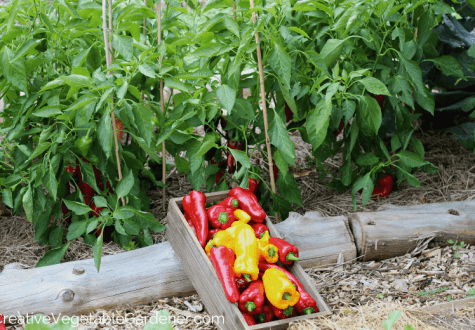Best Fertilizers for Peppers: Improve Development and Flavor with Our Leading Picks
Best Fertilizers for Peppers: Improve Development and Flavor with Our Leading Picks
Blog Article
Just How Plant Foods Play a Vital Function in Cultivating Plentiful and healthy and balanced Pepper Crops
Fertilizers offer as the foundation of successful pepper growing, offering a critical strategy to nurturing the soil and fostering optimum plant development. The elaborate dance between crucial nutrients and the pepper plants' physical procedures emphasizes the essential role that fertilizers play in making certain a plentiful harvest.
Value of Nutrient-Rich Fertilizers
The usage of nutrient-rich fertilizers plays a pivotal function in improving the efficiency and quality of pepper crops in contemporary agricultural methods. Pepper plants call for a well balanced mix of vital nutrients to prosper and generate high returns of quality fruits. Phosphorus, potassium, and nitrogen are primary nutrients that are essential for the growth and advancement of pepper plants. Nitrogen help in leafy eco-friendly growth and total plant vigor, phosphorus sustains origin advancement and flower production, while potassium adds to condition resistance and fruit top quality.
Inadequate levels of these nutrients can result in stunted growth, lowered returns, and susceptibility to diseases (best fertilizers for peppers). Nutrient-rich fertilizers provide a targeted remedy to guarantee that pepper plants receive the necessary elements for optimal growth and performance. Additionally, these fertilizers aid improve soil fertility with time, developing a sustainable setting for long-lasting pepper cultivation
Enhancing Plant Growth and Growth
To optimize plant development and advancement in pepper crops, strategic application of nutrient-rich fertilizers is crucial. Plant foods play an important duty in enhancing the general health and productivity of pepper plants by offering them with vital nutrients that might be lacking in the soil. Nitrogen, potassium, and phosphorus are key macronutrients required in big amounts by peppers for robust growth. Nitrogen help in leafed eco-friendly growth and general plant vitality, phosphorus sustains origin advancement and blossom formation, while potassium adds to disease resistance and fruit high quality.
Along with these macronutrients, trace elements such as magnesium, iron, and zinc are likewise vital for the proper functioning of numerous plant processes. Iron, as an example, is necessary for chlorophyll production, which is necessary for photosynthesis and general plant growth. Zinc plays a vital duty in enzyme task and hormonal agent synthesis, affecting plant growth and development at a cellular level. Magnesium is crucial for the formation of chlorophyll and overall energy transfer within the plant.

Boosting Condition Resistance With Fertilizers
By purposefully including targeted fertilizers, farmers can reinforce the illness resistance of pepper plants, making sure optimal plant wellness and performance. Plant foods consisting of vital nutrients like potassium, phosphorus, and nitrogen play a vital duty in reinforcing pepper plants' body immune systems, making them a lot more resistant to different conditions. Nitrogen, for instance, aids in the production of healthy proteins that are essential for plant protection mechanisms. Phosphorus adds to root development, making it possible for plants to much better take in nutrients and water, therefore boosting their ability to fend off illness. Potassium controls procedures that boost overall plant health, making peppers much more robust against microorganisms.

Maximizing Pepper Yield Through Fertilizing
Making browse this site use of a well balanced fertilization approach is crucial to achieving optimum pepper yield and ensuring optimal crop efficiency. By providing peppers with the right nutrients at the correct time, farmers can dramatically click here to find out more boost their return capacity. Nitrogen, potassium, and phosphorus are crucial elements for pepper growth, with nitrogen helping in fallen leave and stem advancement, phosphorus sustaining root growth and flower development, and potassium promoting overall plant health.
To maximize pepper yield, it is essential to carry out soil examinations to determine existing nutrient degrees and recognize any kind of shortages that require to be addressed. Based on these outcomes, farmers can create a customized fertilizing plan that satisfies the particular requirements of their pepper plants. Additionally, appropriate fertilizing methods such as split applications throughout the expanding season can ensure constant nutrient availability for the plants.

Sustainable Fertilizer Practices for Peppers
In considering lasting fertilizer methods for peppers, it is important to concentrate on lasting soil wellness and environmental stewardship in conjunction with maximizing plant efficiency. One vital method is the usage of organic fertilizers such as compost, manure, or cover crops, which not just give necessary nutrients to the peppers however also contribute to dirt framework and microbial task. best fertilizers for peppers.
Furthermore, precision agriculture methods, such as soil testing and targeted nutrient applications, can help optimize fertilizer use, making certain that peppers get the nutrients they need without excess overflow right into rivers. that site This not only benefits the environment by lowering air pollution yet additionally saves costs for farmers by lessening waste. By embracing lasting plant food techniques, pepper farmers can safeguard the health of their plants, dirt, and bordering environments for future generations.
Verdict
In final thought, fertilizers are important for growing healthy and balanced and bountiful pepper plants. best fertilizers for peppers. They supply needed nutrients for plant development and growth, boost illness resistance, and optimize return. By applying sustainable plant food practices, farmers can make sure the long-term health of their pepper crops and contribute to a more effective and environmentally-friendly farming system
The complex dancing in between crucial nutrients and the pepper plants' physical procedures emphasizes the critical function that plant foods play in guaranteeing an abundant harvest.To optimize plant development and growth in pepper crops, critical application of nutrient-rich plant foods is vital. Fertilizers play a critical duty in improving the total wellness and performance of pepper plants by offering them with essential nutrients that may be lacking in the soil.By tactically integrating targeted fertilizers, farmers can reinforce the disease resistance of pepper crops, guaranteeing optimum plant health and efficiency. Plant foods including vital nutrients like potassium, phosphorus, and nitrogen play a critical function in strengthening pepper plants' immune systems, making them extra resilient to different diseases.
Report this page